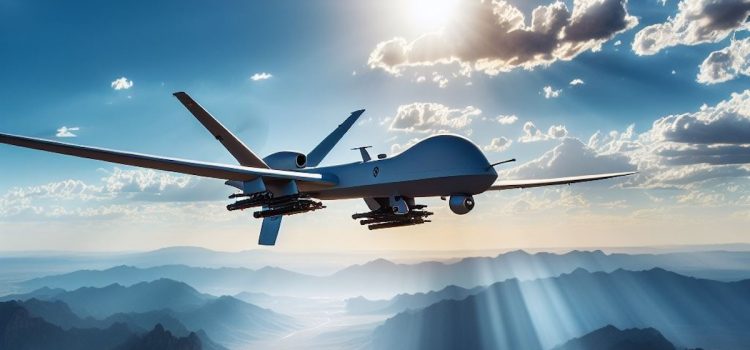
How does Ukraine’s secretive drone program aim to counter Russian aggression? What are the key concerns regarding the potential escalation of conflict resulting from Ukraine’s drone attacks on Russia itself?
An episode of The Daily podcast dived into the bold and secretive world of Ukraine’s drone warfare initiative as it ventures into Russian territory. The discussion explored themes of adaptation, psychological impact, and global implications.
Continue reading for a summary of the episode, along with important context, perspectives worth considering, and recommendations for further reading.
Unveiling Ukraine’s Drone Warfare Initiative
Ukraine has initiated a secretive drone program with the ambitious goal of striking targets within Russian territory, a bold move explored in this revealing podcast episode. Ukraine’s drone attacks on Russia are in response to Russian drone attacks supported by Iranian technology.
Limited support from Western nations led to a collaboration between government and private entities to modify existing reconnaissance drones for offensive purposes, laying the groundwork for indigenous drone development.
The imperative to innovate arose from the global community’s reluctance to provide Ukraine with offensive tools that could escalate the conflict. Despite early challenges such as technical failures and crashes, Ukrainian government and private sectors intensified their efforts as the situation grew more dire.
A notable instance highlighted in the podcast is when Ukrainian drones unexpectedly attacked the Kremlin, showcasing the program’s capability to target high-profile locations. Christiaan Triebert’s Visual Investigations team meticulously analyzed these attacks using available visual data.
As the initiative progressed, the drones demonstrated significant improvement in executing tactical strikes. These attacks are crucial not only for operational success but also for the psychological aspect of warfare.
Context
In the ongoing conflict between Ukraine and Russia, Ukraine has taken a bold step in its fight against Russian aggression by launching a secretive drone program. This initiative aims to strike targets within Russian territory using modified reconnaissance drones. To understand the significance of Ukraine’s drone warfare initiative, it’s crucial to have background knowledge of the conflict itself.
One prominent theme that emerges from Ukraine’s drone program is innovation and adaptation in response to limited support from Western nations. Due to concerns about escalating the conflict, Western nations have been hesitant to supply offensive tools to Ukraine. As a result, Ukraine has turned towards indigenous solutions by developing its own drone technology for military purposes. This demonstrates their determination to counter Russian aggression despite facing challenges in obtaining external support.
Another significant theme is the psychological aspect of warfare and the impact of tactical strikes. By utilizing drones for targeted strikes within Russian territory, Ukraine aims not only to inflict physical damage but also psychological pressure on their adversary. The ability to conduct precision strikes can disrupt enemy operations and create fear among Russian forces. This highlights how modern warfare involves not only conventional tactics but also psychological strategies aimed at weakening the opponent’s morale.
Looking ahead, there are several implications worth considering. First, there’s potential for an escalation of the conflict as a result of Ukraine’s drone program provoking further retaliation from Russia. Also, this development underscores the continued advancement and utilization of drone technology in warfare globally. Other countries might take note of Ukraine’s initiative and consider adopting similar programs as they seek innovative ways to address security challenges.
More Perspectives
The recent unveiling of Ukraine’s secretive drone program, aimed at striking targets within Russian territory, has raised concerns and sparked a need for critical analysis. While the program can be seen as a response to Russian aggression and an attempt to deter further attacks, there are valid counterarguments that warrant careful consideration.
One key concern is the potential escalation of the conflict. By launching drone strikes within Russian territory, Ukraine risks provoking a stronger military response from Russia. This could lead to an escalation of hostilities, resulting in more casualties and further destruction. Also, the collaboration between government and private entities in this covert operation raises questions about accountability and transparency. Without proper oversight and regulations, there’s a risk that the program could be exploited for purposes other than self-defense or national security.
Another point of contention lies in the effectiveness of modifying existing reconnaissance drones. While it might offer cost-effective solutions in the short term, it might not provide Ukraine with advanced technology necessary to effectively counter Russian drone attacks. Developing indigenous drone technology from scratch could potentially yield better results in terms of capabilities and effectiveness.
Concerns have been raised regarding the hesitance of the global community to supply offensive tools to Ukraine. This hesitance might stem from concerns about further escalating the conflict and destabilizing the region. Diplomatic negotiations and peaceful resolutions are prioritized by many nations as a means to address tensions between Ukraine and Russia.
It’s crucial to consider alternative perspectives when evaluating such programs. The focus should not solely be on offensive actions but also on de-escalation efforts through dialogue and diplomacy. A comprehensive analysis that takes into account potential consequences, limitations, and biases present in sources of information can contribute toward a more balanced understanding of Ukraine’s drone warfare initiative.
Related Reading
Exclusive: Inside Ukraine’s secretive drone program | CNN
Ukraine has a secretive drone program focused on developing combat drones to attack Russian positions. The program has seen a surge in drone developers since Russia’s occupation of Crimea and the Donbas region.
Russia-Ukraine war live: wave of drone attacks on Kyiv for second night
Russia launched waves of drone attacks on Kyiv, with Ukrainian air defense systems destroying about 10 drones.
How the use of drones in Ukraine has changed war as we know it
Drones have become a weapon of choice in the war in Ukraine, changing the nature of warfare.
Both sides in the conflict are using cheap, small commercial drones primarily for reconnaissance and targeting artillery.
How Drones May Reshape the Economy, If They’re Allowed To
The global drone market is expanding rapidly and is expected to reach $56 billion by 2030. However, strict FAA regulations on drone flights are limiting further growth of commercial drone services.
Battlegrounds by H. R. McMaster
According to Gen. H.R. McMaster, the United States views the world through a self-centered lens, assuming that its policy decisions are the main driving force behind global events. Because of this distorted perspective, the US has lost influence on the global stage at a time when authoritarian aggression is on the rise. In Battlegrounds, McMaster, who was US national security adviser in 2017-18, contends that American leaders must learn to see the world through the eyes of the US’s adversaries in order to defend against foreign threats and compete in the modern global landscape.
In this book guide, we explore McMaster’s criticism of the assumptions driving US foreign policy, his assessment of the threats America faces, and the steps he believes the US must take. We compare McMaster’s views with those of other experts on diplomacy, while placing his assessments in their larger context and updating some of his information based on events since the book’s publication.






